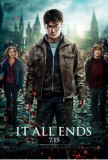Starting tomorrow, SHOWBUZZDAILY will be counting down the days to the release of HARRY POTTER AND THE DEATHLY HALLOWS (PART 2) by running retrospective reviews of each of the previous films, one per day for the next week. But before we look at each of the movies individually, it's worth a moment to look at the series as a collective phenomenon.
There is, of course, the money: a staggering $6.3 billion dollars earned over 7 films globally--and that's just theatrical revenues; it doesn't include homevideo, TV licensing or the gigantic merchandising the series has generated. But other series have earned billions--according to Boxofficemojo, the Star Wars movies, if adjusted for inflation, earned well over $4 billion in the US market alone. And yet there's something unique about the Potter series that goes beyond the dollars.
Perhaps it's the fact that notwithstanding all the giant franchises to which it is often compared (not just Star Wars, but James Bond, Lord of the Rings, Pirates of the Caribbean and Transformers among others), one could just as well compare Potter to a series most people have never even heard of: the documentaries known as 7 Up!.
7 Up! began as a 39 minute short in 1964: a group of 7-year olds throughout Great Britain were interviewed about their lives, ambitions, interests, and other matters. Then, every 7 years, a crew (mostly directed by Michael Apted) returned to the same group--or those who would still participate--following them into their teens and then adulthood, in 7 Plus 7, 21 Up, 28 Up, 35 Up, 42 Up and 49 Up. As we watched, these once-children fell in and out of love, had satisfying and heartbreaking lives, realized and squandered their potential--it was an extraordinarily simple idea with epic power.
The Harry Potter series comes as close as a scripted fantasy story can to taking place in real time. Daniel Radcliffe, Rupert Grint and Emma Watson were 9 or 10 years old when they were cast in the first movie; they're in their 20s now, and millions of people have watched them grow from year to year along with the characters they play. Those characters have darkened and deepened, become increasingly complex, with each successive book and film adaptation, a process which feels like genuine aging. For better or worse, few actors in screen history have been so identified with their screen personas, and just as some of the children in 7 Up! found their participation a burden in later life, so may these 3. (Although unlike the documentary stars, they have many millions of dollars to console them.) Beyond the magic, the wands, the curses and creatures, there's been a level of actual reality to the Harry Potter saga that no other movie series can claim.
Also, the Potter story doesn't just advance from film to film--it actually has an ending. 50 years and several stars later, James Bond is still cranking out movies, and the superhero series just keep spinning new adventures, with periodic "reboots". Revenge of the Sith never felt like a conclusion, because it was just the segue to the original Star Wars movies. The last series to have a full "this story is over" finale was the third Lord of the Rings (and now, of course, we have 2 new Hobbit movies coming, as that series goes the prequel route). But as far as any of us know, for now at least, this will be the last Potter movie ever. The fact that we've been proceeding to a certain ending has made each chapter feel like more of an event (I'd compare it to the ending of Lost, but let's not go there).
And so, 9 1/2 years after the release of Harry Potter and the Sorcerer's Stone, after 1179 minutes of screen time (that's 19 hours and 39 minutes, not counting deleted scenes on the DVDs), the tale will be told. Tomorrow, let's start talking about how the telling went.







0 comments:
Post a Comment